148 scholarly books by Karolinum Press and 7
start with M
148 scholarly books by Karolinum Press and 7
148 scholarly books by Karolinum Press
7 start with M start with M
7 start with M start with M

Making the Most of Tomorrow
A Laboratory of Socialist Modernity in Czechoslovakia
Matej Spurný
Karolinum Press, 2019
Most, one of the most impressive historical cities of Northern Bohemia, was destroyed in the sixties and seventies for coal mining. When plans to redevelop the city began, hope and expectations ran high; in the end, however, Most became a symbol for the heartless incompetence of Czechoslovak communism.
In this book, Matěj Spurný explores the historical city of Most from the nineteenth century into the years following World War II, investigating the decision to destroy it as well as the negotiations concerning the spirit of the proposed new city. Situating postwar Most in the context of cultural and social shifts in Czechoslovakia and Europe as a whole, Spurný traces the path a medieval city took to become a showcase of brutalist architecture and the regime’s technicist inhumanity.
But the book, like the city of Most itself, does not end in tragedy. Fusing architectural and political history with urban and environmental studies, Spurný’s tale shows the progress that can be made when Czechs confront the crimes of the past—including the expulsion of local Germans and the treatment of the Romani minority—and engage with rational, contemporary European concepts of urban renewal.
In this book, Matěj Spurný explores the historical city of Most from the nineteenth century into the years following World War II, investigating the decision to destroy it as well as the negotiations concerning the spirit of the proposed new city. Situating postwar Most in the context of cultural and social shifts in Czechoslovakia and Europe as a whole, Spurný traces the path a medieval city took to become a showcase of brutalist architecture and the regime’s technicist inhumanity.
But the book, like the city of Most itself, does not end in tragedy. Fusing architectural and political history with urban and environmental studies, Spurný’s tale shows the progress that can be made when Czechs confront the crimes of the past—including the expulsion of local Germans and the treatment of the Romani minority—and engage with rational, contemporary European concepts of urban renewal.
[more]
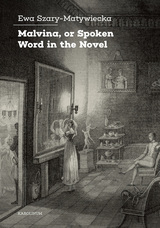
Malvina, or Spoken Word in the Novel
Ewa Szary-Matywiecka
Karolinum Press, 2020
In this book-length study, Ewa Szary-Matywiecka examines Maria Wirtemberska’s Malvina, or the Heart’s Intuition, an international success upon its publication in 1816 that is now widely considered to be Poland’s first psychological novel. Applying structuralist methods, Szary-Matywiecka situates Wirtemberska among other literary luminaries of her day, including Rousseau and Goethe, and explores how the nineteenth-century salon culture formed the concerns and themes of her novel. Malvina’s obsession with language games recall the vocabulary quizzes and semantic puzzles popular in the European salons frequented by Wirtemberska. Szary-Matywiecka also argues that the novel’s motif of twins and twinned characters emerges from both the theatrical preoccupations of salons, as well as how Wirtemberska seemingly splits her voice between traditional narration and a more intrusive authorial style, helping shape her novel’s innovative narrative method. Malvina, or Spoken Word in the Novel is an insightful deconstruction of a female-penned classic of European literature.
[more]
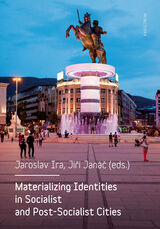
Materializing Identities in Socialist and Post-Socialist Cities
Edited by Jaroslav Ira and Jirí Janác
Karolinum Press, 2017
Following the so-called “Material Turn” of historiography, this book explores the materialization of identity in urban space—specifically in Eastern Europe and Central Asia. Urban spaces played an important role in the formation of national identities in post-socialist successor states across the region, while at the same time the articulation of national identities markedly affected the appearance of these post-socialist cities. Beginning with an overview of socialist and post-socialist cities in recent urban history, contributors trace the post-socialist intertwining of space and identities in case studies that include Astana and Almaty in Kazakhstan, Chișinău and Tiraspol in Moldova, and Skopje in Macedonia, while also linking this phenomenon to socialist urbanism, as in postwar Minsk, Belarus.
[more]

Midway Upon the Journey of Our Life
Josef Jedlicka
Karolinum Press, 2016
Written between 1954 and 1957 and treating events from the Stalinist era of Czechoslovakia’s postwar Communist regime, Midway Upon the Journeyof Our Life flew in the face of the reigning aesthetic of socialist realism, an anti-heroic novel informed by the literary theory of Viktor Shklovsky and constructed from episodes and lyrical sketches of the author and his neighbors’ everyday life in industrial north Bohemia, set against a backdrop of historical and cultural upheaval.
Meditative and speculative reflections here alternate and overlap with fragmentary accounts of Jedlicka’s own biography and slices of the lives of people around him, typically rendered as overheard conversations. The narrative passages range in chronology from May 1945 to the early 1950s, with sporadic leaps through time as the characters go about the business of “building a new society” and the mythology that goes with it. Due to its critical view of socialist society, Midway remained unpublished until 1966, amid the easing of cultural control, but a complete version of this darkly comic novel did not appear in Czech until 1994.
Meditative and speculative reflections here alternate and overlap with fragmentary accounts of Jedlicka’s own biography and slices of the lives of people around him, typically rendered as overheard conversations. The narrative passages range in chronology from May 1945 to the early 1950s, with sporadic leaps through time as the characters go about the business of “building a new society” and the mythology that goes with it. Due to its critical view of socialist society, Midway remained unpublished until 1966, amid the easing of cultural control, but a complete version of this darkly comic novel did not appear in Czech until 1994.
[more]
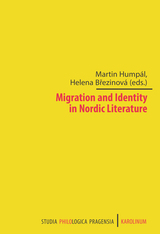
Migration and Identity in Nordic Literature
Edited by Martin Humpál and Helena Brezinová
Karolinum Press, 2022
An examination of representations of human migration in three centuries of Northern European literature.
Migration is a frequent topic of many debates nowadays, whether it concerns refugees from war-torn areas or the economic pros and cons of the mobility of multinational corporations and their employees. Yet such migration has always been a part of the human experience, and its dimensions—with its shifting nature, manifestations, and consequences—were often greater than we can imagine today.
In this book, ten scholars from Czechia, Denmark, the Netherlands, Norway, Poland, and Sweden focus on how migration has manifested itself in literature and culture through the nineteenth, twentieth, and early twenty-first centuries in Denmark, Norway, Sweden, Finland, and Iceland. Examining the theme of migration as it relates to questions of identity, both national and individual, the authors argue that migration almost always leads to a disturbance of identity and creates a potential for conflicts between individuals and larger groups. The book digs deep into such cases of disturbance, disruption, and hybridization of identity as they are represented in three centuries of literary works from the European North.
Migration is a frequent topic of many debates nowadays, whether it concerns refugees from war-torn areas or the economic pros and cons of the mobility of multinational corporations and their employees. Yet such migration has always been a part of the human experience, and its dimensions—with its shifting nature, manifestations, and consequences—were often greater than we can imagine today.
In this book, ten scholars from Czechia, Denmark, the Netherlands, Norway, Poland, and Sweden focus on how migration has manifested itself in literature and culture through the nineteenth, twentieth, and early twenty-first centuries in Denmark, Norway, Sweden, Finland, and Iceland. Examining the theme of migration as it relates to questions of identity, both national and individual, the authors argue that migration almost always leads to a disturbance of identity and creates a potential for conflicts between individuals and larger groups. The book digs deep into such cases of disturbance, disruption, and hybridization of identity as they are represented in three centuries of literary works from the European North.
[more]
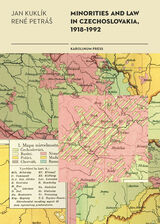
Minorities and Law in Czechoslovakia
Jan Kuklík and René Petráš
Karolinum Press, 2017
Across the whole of modern Czech history—from 1918, through World War II, and into the postwar years—ethnic and minority issues have been of the utmost prominence. Moreover, Czechoslovakia has in the past been held up as a model for solving problems related to ethnic and minority tensions through legal regulations—regulations that played a key role in delineating minority status. Primarily intended for an international, non-Czech audience, this book takes a long-term perspective on issues related to ethnic and language minorities in Czechoslovakia. Bridging legal and historical disciplines, Jan Kuklík and René Petráš show that as ethnic minority issues once again come to the forefront of policy debates in Europe and beyond, a detailed knowledge of earlier Czech difficulties and solutions may help us to understand and remedy contemporary problems.
[more]
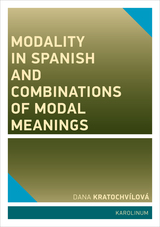
Modality in Spanish and Combinations of Modal Meanings
Dana Kratochvílová
Karolinum Press, 2019
With a focus on Spanish modality, this book presents Bohumil Zavadil’s theoretical approach—the first such presentation in English—to this category and, consequently, analyzes its possible application to Spanish. Concentrating on specific areas of the Spanish modal system where two modal meanings combine, Dana Kratochvílová integrates theoretical analyses with corpus-based studies from the InterCorp corpus on the choice of mood and the contextual interpretation of selected constructions. Her approachs verifies that areas where two modal meanings meet are a natural part of the Spanish modal system and that the combination of modal meanings has consequences on mood selection, thus shedding new light on the use of the subjunctive in Spanish.
[more]
READERS
Browse our collection.
PUBLISHERS
See BiblioVault's publisher services.
STUDENT SERVICES
Files for college accessibility offices.
UChicago Accessibility Resources
home | accessibility | search | about | contact us
BiblioVault ® 2001 - 2024
The University of Chicago Press









